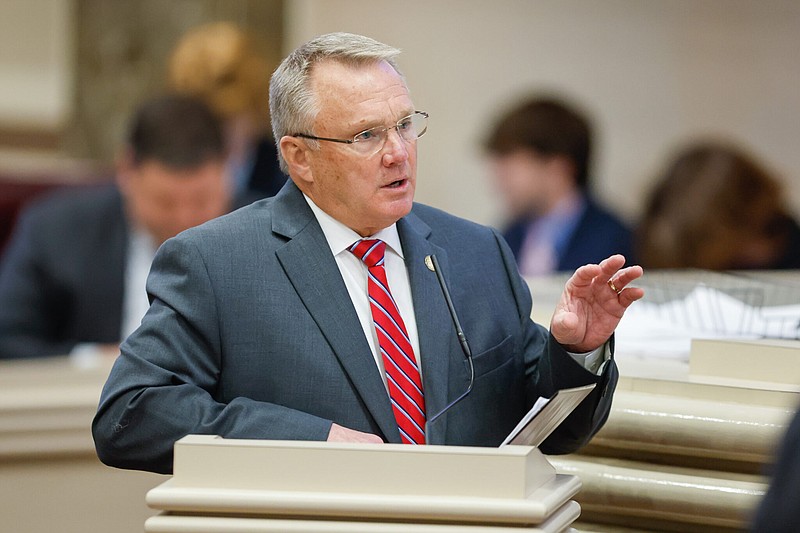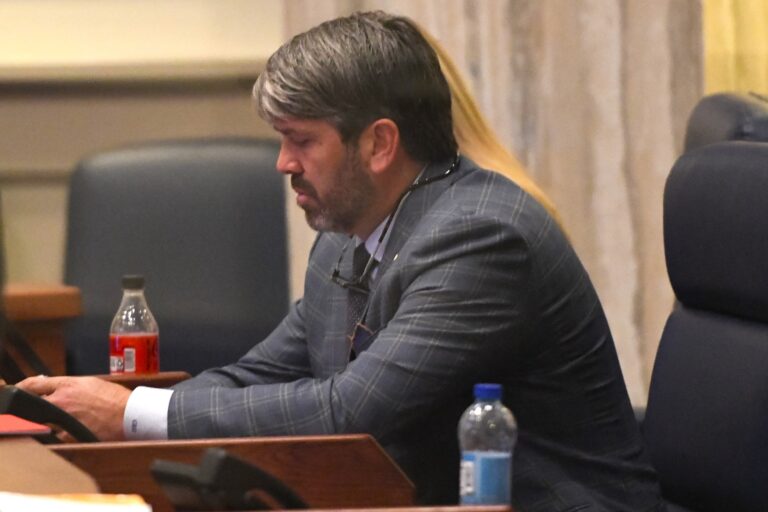A bill to fund the Alabama 988 Suicide and Crisis Lifeline remains in a House committee following disagreements over funding.
House Bill 389, sponsored by House Ways and Means General Fund Chairman Rex Reynolds, R-Huntsville, would create a 988 Suicide and Crisis Call hotline for suicide prevention and crisis management.
It would also require the Department of Mental Health to develop, coordinate and administer Alabama's mental health care initiative, which includes supporting the 988 line.
The sticking point at a House hearing on the bill this past week was a 98-cent tax on cellphone lines to fund the program. The fee drew opposition from telecom companies at the hearing. The companies said the fee was too high.
Alabama Department of Mental Health Commissioner Kim Boswell said she could support a hardship waiver for individuals with lower incomes but also noted her department had gone a decade without increases for mental illness services.
Reynolds moved to hold the bill Wednesday, saying work still had to be done.
(READ MORE: National mental health 988 crisis hotline sees boost in calls from Tennessee)
Another bill, Senate Bill 328, sponsored by Sen. Garlan Gudger, R-Cullman, was introduced in the Senate and passed the Fiscal Responsibility and Economic Development Committee on Wednesday on a 9-0 vote, with one abstention.
Reynolds said Thursday the bill in the Senate includes the amendments he's worked on with the telecommunications industry and the Alabama Department of Mental Health.
The Senate version, which the House may take as a substitute, sets the fee at 98 cents indefinitely beginning Oct. 1, 2024. The bill that as introduced initially would have allowed the 988 commission to establish the fee on a yearly basis at anywhere between 98 cents and $3.
The Senate bill also added more members to the 988 commission, including one representative from each of the following: the Alabama Fire College, the Alabama Association of 911 Districts, the Alabama Hospital Association and a rural telephone company. It would also include the director of the Alabama 911 Board, or his or her designee.
Cleo Washington, vice president of AT&T, said at Wednesday's Senate committee hearing the wireless association has been working with Reynolds on how to pay for the services that he said should be provided.
"Whether this should be something from the wireless industry that, if it is a level of priority, and it is – funded through the General Fund as opposed to a separate fee, or separate tax," Washington said. "That's our only issue that we hope the committee considers that, and we want to put that on the table."
Reynolds said there are discussion that the bill could start in the Senate because there are other components to the bill than the tax portion, and that it was substituted with the House version.
The bill would also set up the 988 Commission, which would serve as an advisory body of the 988 Crisis Care Fund, and the commission would be responsible for developing a mechanism that would provide a hardship waiver process for individuals who cannot pay the 98-cent user fee.
"Now, we've got 11 associations falling in behind the bill and supporting the bill," Reynolds said. "We've still got some work to do."
Reynolds said that the bill could be back in committee as early as this week.
Holly McCorkle, executive director at the Alabama Council for Behavioral Healthcare, said that in the years she's worked in the mental health space, this is the "biggest piece of mental health legislation that's been before the Alabama legislature." The bill could help achieve the goal of having some kind of 24/7 service in every county.
(READ MORE: Chattanooga summit to examine stigma around mental health in Black community)
"With the amount of money that would be generated by this fee, this would be more than what's already been invested in crisis services through the legislature in the past few years," she said.
Five states have enacted legislation that funds these services via a telecommunication surcharge, and Alabama's would be the highest, at more than double the rate in Washington state (40 cents), the current highest fee.
Washington, however, also appropriated $23 million from its General Fund budget towards the lifeline implementation, according to the National Academy for State Health Policy. Of the 13 states that have appropriated funds from the state budget, three also implemented a telecom surcharge.
But with less than one-third of the legislative session to go, Reynolds said that each day is an unknown.
"We're winding down the days, and we're in a very critical time," he said. "Every day will tell the tale."
Read more at AlabamaReflector.com.

